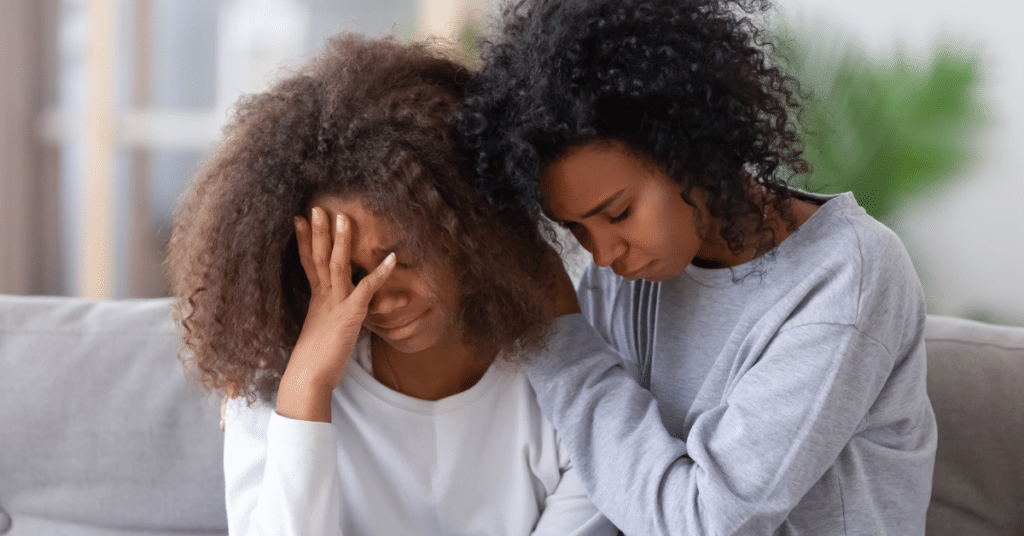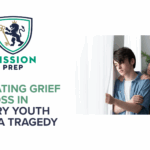For teens dealing with loss, grief can cause a confusing whirlwind of emotions. They may feel overly intense feelings of loss and anger, or emotional numbness and “flatness” – or shift between both.
No matter how a teen experiences grief, their feelings are important and valid. It can be difficult in the here and now to see beyond feelings of pain, but healthy ways of grieving can act as a medicine.
Moving on with your life isn’t the same as forgetting what you’ve lost. It’s accepting that someone or something important to you is gone, but also that you can keep memories alive and still enjoy life. Grief doesn’t have a timeline, but the information in this article can help you understand how to deal with loss and grief in healthy ways.
What Is Grief in Teens?
Grief is the emotion you experience when you lose someone or something you care about. According to the American Psychological Association (APA), grief can include distress, separation anxiety, confusion, and fear of the future.1
Aside from these feelings, grief can also affect you physically. It can lower immunity to illnesses and cause you to neglect self-care, such as sleep and eating healthily. Grief can also impact your ability to concentrate, school performance, relationships with family and friends, and even your positivity for the future. Extreme cases of grief can even lead to self-harm or thoughts about death. So, as is clear, grief and loss can impact a teen’s life in wide-reaching, serious ways.2
But what causes grief? Well, there’s the obvious source; the death of someone you love. However, even though the loss of a loved one is the most well-known cause of grief, a teen can grieve the loss of anything that destabilizes their sense of normalcy. For instance, a teen might grieve:
- The breakdown of an important friendship
- A lack of stability at home, due to issues such as separation or divorce
- The death of a beloved family pet
- The loss of an important goal or dream
We all grieve in different ways. However, if intense feelings of loss and grief go untreated for a long time, they can lead to a condition called “prolonged grief disorder” or “complicated grief.” Both of these conditions can impact a teen’s emotional and physical health in long-term ways.3
If you’re worried about feelings of grief in yourself or someone else, professional mental health advice and support can help you process your emotions and move past loss.
1. Go Easy on Yourself
Grief affects everyone differently – and it doesn’t have a timeline. Whereas some people may bottle up their emotions or feel “numb,” others may become quick to irritation and anger. These reactions are your mind’s way of trying to protect you from intense pain.
Dealing with loss is highly personal, and whether you feel “flat” or “explosive,” your emotions are valid. What’s more, how you feel when grieving can shift over time. It’s important to go easy on yourself during this period. Grief is hard enough to cope with without getting frustrated at yourself for feeling highly personal emotions. Plus, trying to deny how you’re feeling could lead to more long-term issues, such as complicated grief.
Accepting that you’re experiencing emotional pain – without judging these feelings – is an important step in healing. Doing so can help you develop more self-compassion and the ability to better manage negative emotions.
2. Take Care of Yourself
Often, when grieving, self-care such as healthy eating, exercise, and sleep takes a back seat. However, it’s during times of grief and loss that these self-care activities are most important.4
A lack of sleep and the tiredness it causes can make coping with emotions even more difficult during grief. Creating a sleep routine, such as sticking to a set bedtime, avoiding screens, and using comfortable bedding can help you drift off quicker and feel more revitalized.5
Also, our diet can spark changes in how we feel, so you can cope with grief better when fueling your body in healthy ways. Aim to drink enough water, eat five or more portions of fruit and veg a day, and include whole grains and proteins in your diet.6
We may not be able to sleep or eat feelings of loss away, but self-care acts such as these equip our minds and bodies to cope more effectively.
3. Express Your Thoughts and Feelings
During grief, your thoughts and feelings may change from day to day. Sometimes, you might think about positive memories which make you feel good. Other times, you may feel guilt or shame, which can make your feelings of loss stronger. It’s good to pay attention to how your thoughts and feelings connect.
You can also process thoughts and feelings through journaling, or, if you’re grieving a loved one, you could write your feelings of loss in a letter to them. Journaling or letter writing could include things you wish you said, expressions of gratitude, or just daily records of how you feel. While these writing activities are great ways of expressing thoughts and feelings, it’s also important not to spend too much time on them. You may need to take breaks from intense feelings from time to time.7
4. Move Your Body
Exercise can act as an outlet for emotions associated with grief, such as anger, aggression, and irritability. It also releases “feel good” endorphins in the brain, which might not be working as they should when grieving, helping you naturally feel more positive and able to cope with loss. Additional benefits of exercise during grief are that it can help you sleep better, distract you from emotional pain, and increase your support system if you exercise with friends.8
The thought of exercising might feel too much for you right now, but moving your body, even in gentle ways, can get the ball rolling. For example, you could try gentle stretches, yoga, mindful walking, or even expressive dancing for releasing emotions.
5. Reach Out to Your Support System
During grief, it’s normal to feel like other people couldn’t possibly understand what you’re going through, so you might withdraw from friends and family. But, the thing is, these people will want to understand. They may not know what to say at times, but this doesn’t detract from the fact that they would like to support you – so tell them what you need.
You don’t need to be strong during grief; we all experience it at some stage in life. Whether you need a listening ear, a distraction, a hug, or a shoulder to cry on, support can help you process your grief.9
If you can’t think of anyone to turn to right now, there are grief support groups you could turn to. These groups share experiences, advice, and support, allowing you to see that other people your age may be working through the same things and learning how to cope.
6. Work Through Your Grief
Grief might never entirely go away, but it can become more manageable. As mentioned, the people in our lives can help us cope – especially if they’ve experienced the same loss. Talking to someone you trust can act as an outlet for your loss, a chance to share positive memories, and an important source of support.
However, if you’re struggling to cope with grief, and don’t feel like those close to you could fully understand or support you, professional treatment such as grief counseling could help. Grief counseling uses talk therapy to help people make sense of loss and understand that what they’re experiencing is normal. Also, grief counseling can assist teens in learning how different people cope with grief and loss in various ways. This way, a teen can learn how to come to terms with loss in a way that best suits their needs.
7. Understand the Difference Between Grief and Depression
While grief is a natural reaction to loss, depression can indicate a more serious underlying problem and a need for professional support. Grief can make you feel some of the symptoms of depression, such as ongoing sadness, but there are also some defining differences between grief and depression, including:10
- Grief can come in waves and often includes positive memories. However, the moods and feelings in depression are usually constantly negative.
- Grief doesn’t tend to affect self-esteem. One of the main symptoms of depression is low self-esteem, self-blame, and guilt.
- Grief is a process and a normal reaction to loss. In contrast, depression is a diagnosable mental health condition.
Although grief and depression are separate issues, grief can lead to depression if not managed in adaptive ways. If you’re concerned that grief and loss have led to depression, support and advice are available. You don’t have to deal with these feelings alone.10
How Mission Prep Can Help Teens Dealing With Loss and Grief
Grief is a normal reaction to loss, but this doesn’t make it any easier to cope with. Losing someone or something important to you can make it feel like your world has crashed around you and no one can understand what you’re going through. Time, self-care, and support from others can help you manage grief – but, sometimes, these things aren’t enough.
Professional mental health support can help teenagers cope with grief in healthy ways and prevent feelings of loss from spiralling into more complex conditions such as complicated grief. Mission Prep’s team of licensed professionals can cater treatment packages to a teen’s unique needs in various locations, helping them see that they can keep positive memories alive while also moving past grief. Contact us today to learn more about how we can help a teen dealing with grief and loss.
References
- American Psychological Association. (n.d.). Grief. In APA Dictionary of Psychology. Retrieved [March 4th, 2025], from https://dictionary.apa.org/grief
- Osterweis, M., Solomon, F., & Green, M. (Eds.). (1984). Bereavement: Reactions, consequences, and care. National Academies Press. https://www.ncbi.nlm.nih.gov/books/NBK217849/
- Spuij, M., Reitz, E., Prinzie, P., Stikkelbroek, Y., & Boelen, P. A. (2012). Distinctiveness of symptoms of prolonged grief, depression, and post-traumatic stress in bereaved children and adolescents. European Child & Adolescent Psychiatry, 21(12), 673. https://doi.org/10.1007/s00787-012-0307-4
- Harvard Health Publishing. (2023, May 1). How to deal with grief. Harvard Health. https://www.health.harvard.edu/mind-and-mood/how-to-deal-with-grief
- Monk, T. H., & Germain, A. (2008). Sleep Disturbance in Bereavement. Psychiatric Annals, 38(10), 671. https://doi.org/10.3928/00485713-20081001-06
- Good Food Is Good Medicine. (2022, July 21). Why it’s important for you to drink water and stay hydrated. UC Davis Health. https://health.ucdavis.edu/blog/good-food/why-its-important-for-you-to-drink-water-and-stay-hydrated/2022/07
- Child Mind Institute. (2025, January 28). The power of journaling: What science says about the benefits for mental health and well-being. https://childmind.org/blog/the-power-of-journaling/
- Williams, J., Howlett, N., Shorter, G. W., Zakrzewski-Fruer, J. K., & Chater, A. M. (2023). What roles does physical activity play following the death of a parent as a young person? A qualitative investigation. BMC Public Health, 23, 210. https://doi.org/10.1186/s12889-022-14542-6
- National Institute on Aging. (2023). Coping with grief and loss. U.S. Department of Health and Human Services. https://www.nia.nih.gov/health/grief-and-mourning/coping-grief-and-loss
- American Psychiatric Association. (2013). Major depressive disorder and the “bereavement exclusion”. https://www.psychiatry.org/File%20Library/Psychiatrists/Practice/DSM/APA_DSM-5-Depression-Bereavement-Exclusion.pdf
















